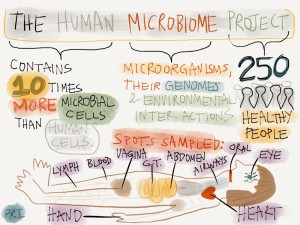 Scientists are finding communities of microorganisms performing essential ecosystem services even in places previously thought to be sterile, and new science is uncovering an unprecedented potential for the application of microorganisms to human, plant, animal, and environmental health; renewable energy production; water treatment; and manufacturing.
Scientists are finding communities of microorganisms performing essential ecosystem services even in places previously thought to be sterile, and new science is uncovering an unprecedented potential for the application of microorganisms to human, plant, animal, and environmental health; renewable energy production; water treatment; and manufacturing.
The study of these communities of microorganisms, or microbiomes, has left researchers with even more questions, such as “What is a healthy microbiome?” “What makes a microbiome resilient to perturbations?” “How can we harness the huge potential of these microbial communities?”
The Life Sciences Subcommittee (LSSC) of the National Science and Technology Council (NSTC) chartered the Fast-Track Action Committee on Mapping the Microbiome (FTAC-MM) to survey Federally-supported microbiome research and make recommendations for Federal investments that would target cross-cutting challenges and areas of need.
Fourteen Federal departments and independent agencies participated in the FTAC-MM’s survey, answering sweeping questions about their investments over the previous three fiscal years (FY12-14) and where the most important research gaps for advancing this field exist. The survey found a total Federal investment in microbiome research of approximately $922 million disbursed to 2,784 projects over the course of three fiscal years, FY12 through FY14. This corresponds to an average of about $307 million each year, and support of microbiome research has increased each year since FY12.
Federal microbiome research investments are dominated by the National Institutes of Health, which funded 59 percent of the investments in microbiome research from FY12-14. Research investments in the human microbiome were larger than any other category, at 37 percent of the total from FY12-14. The FTAC found less activity than expected in agricultural microbiome research, particularly in food-based studies, viral microbiome research, and applied microbiome research and tool development, compared to basic microbiome research.
